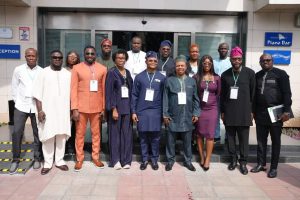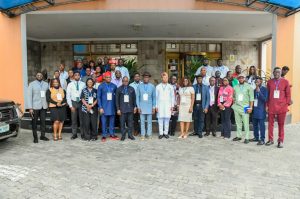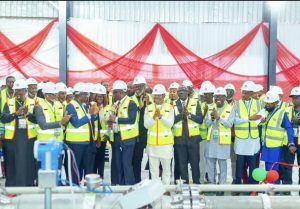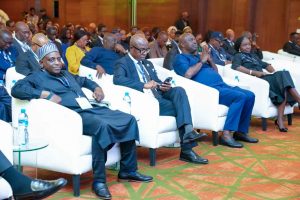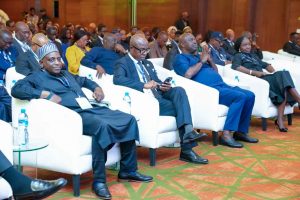The Nigerian Content Development and Monitoring Board (NCDMB) have begun working with the Nigerian National Petroleum Corporation (NNPC), Oando Group, Sahara Energy and other key players in the gas industry to promote local manufacture of gas cylinders.
Rising from a meeting called by the NCDMB at its headquarters in Yenagoa, Bayelsa State recently, stakeholders in the Liquefied Petroleum Gas (cooking gas) downstream sector set up a committee that will develop a strategy that will drive the manufacturing of cylinders, deepen utilization of gas and address challenges that might hinder the plans.
In his welcome address, the Executive Secretary, NCDMB, Engr. Ernest Nwapa remarked that President Goodluck Jonathan’s administration was promoting manufacturing in all sectors of the economy, particularly in the oil and gas industry because of the potentialities of creating thousands of jobs, retaining spend in-country and developing technology.
He described gas cylinder manufacturing as a quick win, noting that local service companies now fabricate complex structures for the oil and gas industry and several companies were investing millions of dollars in setting up facilities and acquiring assets even before securing contracts.
According to him, “once key persons in leadership on the government and industry side agree on the framework, it will work. Today, investors have put down their funds on assets that depend on long term contracts. Gas cylinders are tied directly to a huge market; the opportunities are there, even across the Gulf of Guinea.”
Nwapa confirmed that once local manufacturing of gas cylinders begin, the government would ban the importation of gas cylinders and insist that LPG producers like NLNG and Exxon Mobil deliver gas only to facilities that comply with extant policies.
He clarified that the push for local manufacturing of gas cylinder would be integrated into President Jonathan’s Gas Revolution agenda and complement government’s drive to get all Nigerians to adopt gas as the preferred fuel for cooking.
Nwapa suggested that NCDMB could use a part of the Nigerian Content Development Fund (NCDF) to support companies that are committed to go into gas cylinder manufacturing.
He expressed hope that the Federal Government through the Bank of Industry, Ministry of Petroleum, Central Bank of Nigeria and the Board would work together to provide enablers for the scheme.
In his presentation, the Managing Consultant of PEJAD Nigeria Limited, Engr. Tony Ogbuigwe stated that NCDMB’s gas cylinder manufacturing scheme was supported by Section 53 of the Nigerian Content Act which prohibits the importation of welded steel products. He informed that only five per cent of the 26 million Nigerian families currently use LPG as their cooking fuel, though the NNPC, Oando, Sahara and other stakeholders were implementing several initiatives to grow consumption.
He explained that about 2.5 million cylinders were estimated to be in the country and if 10 per cent of the 26 million families in Nigeria were to use gas, with each owning two cylinders, the demand for gas cylinders will grow to 5 million.
He added, “20 per cent using LPG will generate a demand for 10 million cylinders; 30 per cent using LPG will generate a demand for 20 million cylinders.”
Explaining that gas cylinders have a safe life of about 5 years, Ogbuigwe added, “assuming that 30 per cent of the cylinders will become due for replacement each year, it implies a demand for manufacturing of 3 million cylinders per year. 6 gas cylinder manufacturing plants at 500,000 capacity each will be required.”
In his comments, the Managing Director, NNPC Retail, Mr. Chris Osarumwense pledged the corporation’s commitment to promoting local manufacture of gas cylinders, noting however, that prospective local manufacturers of cylinders must be challenged to meet key safety standards set by the Standards Organisation of Nigeria (SON) and other certifying agencies.
He maintained that gas usage must also be grown reasonably before it can support local manufacturing of gas cylinders on a cost effective basis, suggesting that the price of gas and cylinders must be reduced significantly.
According to him, “most countries that have successfully launched LPG scheme have a domestic price for the product. NNPC has one of the lowest prices for LPG, but the pace with which we sell is much slower than we thought. We need to get the Nigerian Liquefied Natural Gas (NLNG) Company and the Federal Government to develop a domestic prize for LPG. Also kerosene should no longer be subsidized.”
Discover more from Nigerian Content Development & Monitoring Board
Subscribe to get the latest posts sent to your email.

